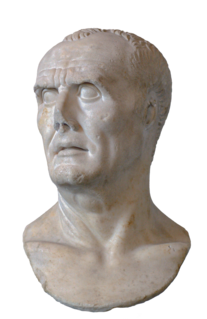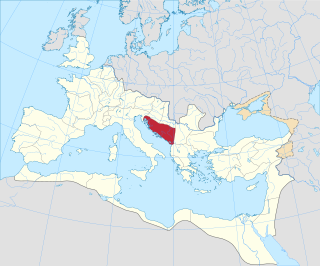Related Research Articles

Titus Aelius Hadrianus Antoninus Pius was Roman emperor from 138 to 161. He was one of the Five Good Emperors from the Nerva–Antonine dynasty.

Marcus Aurelius Antoninus was Roman emperor from 161 to 180 and a Stoic philosopher. He was the last of the rulers known as the Five Good Emperors, and the last emperor of the Pax Romana, an age of relative peace and stability for the Roman Empire. He served as Roman consul in 140, 145, and 161.

This article concerns the period 109 BC – 100 BC.

Gaius Marius was a Roman general and statesman. Victor of the Cimbric and Jugurthine wars, he held the office of consul an unprecedented seven times during his career. He was also noted for his important reforms of Roman armies. He set the precedent for the shift from the militia levies of the middle Republic to the professional soldiery of the late Republic; he also improved the pilum, a javelin, and made large-scale changes to the logistical structure of the Roman army.

The princeps senatus was the first member by precedence of the Roman Senate. Although officially out of the cursus honorum and possessing no imperium, this office conferred prestige on the senator holding it.

The Jugurthine War was an armed conflict between the Roman Republic and king Jugurtha of Numidia, a kingdom on the north African coast approximating to modern Algeria. Jugurtha was the nephew and adopted son of Micipsa, King of Numidia, whom he succeeded on the throne, overcoming his rivals through assassination, war, and bribery.

The gens Cornelia was one of the greatest patrician houses at ancient Rome. For more than seven hundred years, from the early decades of the Republic to the third century AD, the Cornelii produced more eminent statesmen and generals than any other gens. At least seventy-five consuls under the Republic were members of this family, beginning with Servius Cornelius Maluginensis in 485 BC. Together with the Aemilii, Claudii, Fabii, Manlii, and Valerii, the Cornelii were almost certainly numbered among the gentes maiores, the most important and powerful families of Rome, who for centuries dominated the Republican magistracies. All of the major branches of the Cornelian gens were patrician, but there were also plebeian Cornelii, at least some of whom were descended from freedmen.

Pannonia Superior, lit. Upper Pannonia, was a province of the Roman Empire. Its capital was Carnuntum. It was one on the border provinces on the Danube. It was formed in the year 103 AD by Emperor Trajan who divided the former province of Pannonia into two parts: Pannonia Superior and Pannonia Inferior. The province included parts of present-day states of Austria, Croatia, Hungary, Slovakia, and Slovenia.

Dalmatia was a Roman province. Its name is derived from the name of an Illyrian tribe called the Dalmatae, which lived in the central area of the eastern coast of the Adriatic Sea. It encompassed the northern part of present-day Albania, much of Croatia, Bosnia and Herzegovina, Montenegro, Kosovo and Serbia, thus covering an area significantly larger than the current Croatian region of Dalmatia. Originally this region was called Illyria or Illyricum.
Lucius Pedanius Secundus was a Roman senator of the first century. In AD 43, during the reign of Claudius, he was consul suffectus from the Kalends of March to the Kalends of July, together with Sextus Palpellius Hister. Secundus was the first senator from the Spanish provinces to achieve the rank of consul since the anomalous tenure of Lucius Cornelius Balbus in 40 BC.
Gaius Avidius Nigrinus was a Roman senator who lived between the 1st and 2nd centuries. Nigrinus served as suffect consul for the nundinium of April to June 110 with Tiberius Julius Aquila Polemaeanus as his colleague.

The gens Annia was a plebeian family at ancient Rome. Livy mentions a Lucius Annius, praetor of the Roman colony of Setia, in 340 BC, and other Annii are mentioned at Rome during this period. Members of this gens held various positions of authority from the time of the Second Punic War, and Titus Annius Luscus attained the consulship in 153 BC. In the second century AD, the Annii gained the Empire itself; Marcus Aurelius was descended from this family.
The First Battle of Clusium was a battle that took place in June of 82 BC during the Roman Republic's Second Civil War. The battle pitted the Optimates under the command of Lucius Cornelius Sulla against the Populares commanded by Gnaeus Papirius Carbo. The battle was indecisive.
Publius Sittius was a Roman equites and mercenary commander. As a mercenary he was employed by king Bocchus II of East-Mauretania. Sittius fought for Bocchus against king Juba I of Numidia, capturing Juba's capital of Cirta and defeating the Numidian army under general Saburra. He also supported Julius Caesar in the civil war between Caesar and the Optimates, ultimately catching and killing Faustus Cornelius Sulla and Lucius Afranius and destroying Scipio's fleet off Hippo Regius. He was a personal friend of Marcus Tullius Cicero.
LuciusFulcinius Trio was a Roman senator who came from a plebeian family. Trio was an active prosecutor (delator) during the reign of Tiberius who developed a reputation for making accusations. He was governor of Lusitania from about 21 to 31, before returning to Rome to hold the office of consul suffect with Publius Memmius Regulus in 31. His friendship with Sejanus would lead to allegations that ended with his suicide in early 35.

The gens Publicia, occasionally found as Poblicia or Poplicia, was a plebeian family at ancient Rome. Members of this gens are first mentioned in history during the period following the First Punic War, and the only one to achieve the consulship was Marcus Publicius Malleolus in 232 BC.
Punicus was a chieftain of the Lusitanians, a proto-Celtic tribe from western Hispania. He became their first military leader during the Lusitanian War, and also led their first major victories against Rome.
Caesarus was a chieftain of the Lusitanians, a proto-Celtic tribe from western Hispania. He followed and later replaced Punicus as their major military leader during the Lusitanian War.
The Battle of Hippo Regius was a naval encounter during Caesar's Civil War which occurred off the coast of the African city of Hippo Regius in 46 BC. Metellus Scipio and a number of influential senators from the Optimate faction were fleeing the disastrous Battle of Thapsus when their fleet was intercepted and destroyed by Publius Sittius, a mercenary in the employ of Gaius Julius Caesar's Populares. Scipio committed suicide and all of the other senators were killed during the battle.
References
- ↑ João Luís Cardoso; Martin Almagro Gorbea (eds.). Lucius Cornelius Bocchus escritor lusitano da Idade de Prata da Literatura Latina. Real Academia de la Historia. pp. 330–. ISBN 978-84-15069-36-2.
- ↑ The Fragments of the Roman Historians. Oxford University Press. pp. 635–. ISBN 978-0-19-927705-6.
- ↑ Plin HN 37.24.5 http://latin.packhum.org/loc/978/1/2664/620-637